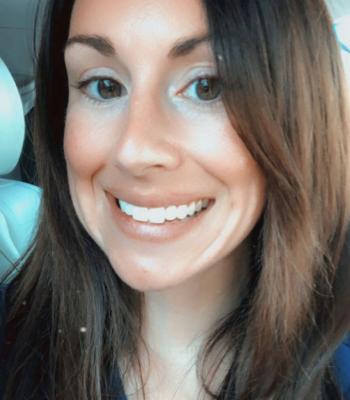
My Journey to a POTS and Possible EDS Diagnosis at 35 Years Old
Erin, age 35, South Carolina
I was just recently diagnosed with POTS in 2022. Until recently, I was a healthy person who went to the gym regularly and ran cross country in college. Other than various sports injuries, I never had health problems. That changed when I contracted COVID in November 2020. I had almost no symptoms of the virus other than not being able to smell or taste anything. Then a few weeks later, I started to experience constant dizziness. I kind of brushed it off and didn’t think too much about it.
When I got pregnant with my daughter in May 2021, my health took an immediate downward turn. One day after just leaving my doctor’s office for a routine OB checkup, I sat in my car and could feel my heart racing fast. Thinking it was an anxiety attack, I tried to just breathe through it and drive myself home, but I started getting so dizzy I had to pull over. I called my husband and he took me to the emergency room. This was 1 of 5 ER visits I would make over the course of my pregnancy. The doctors who treated me in the ER each time could find no reason for my heart to be racing. They would give me fluids, let me lie down and my heart rate would come down. The monitor never showed anything other than sinus tachycardia so they were not able to tell me much of anything other than my heart was racing but they didn’t know why.
My OB doctor referred me to a cardiologist that was in the same network as their hospital. When I went to see him, he immediately brushed me off and said that sometimes pregnant women have their heart race. He told me my heart rate “wasn’t that high” despite me sitting there in his office with a heart rate over 140. He refused to give me a Holter monitor and instead looked at my apple watch data and said there was nothing to worry about. I left in tears. I felt so lost and discouraged that none of the doctors I had seen had any answers. One day at work I was having a particularly bad attack that led me to lay in the middle of the floor and chug an entire Gatorade while sweating and shaking like a leaf. My coworker felt so bad for me she called one of her friends who happens to be a cardiologist who owns his own cardiology practice. Thanks to my coworker and her friend, they found an electrophysiologist (cardiologist) and got me an appointment with him.
When I met my new doctor it was obviously he was a lot more caring and compassionate than the other cardiologist had been. He also told me that sometimes this is related to pregnancy and he wanted to be conservative with what we did until after my baby was born but that it sounded like it could be POTS to him. He went ahead and set me up with a Holter monitor that I wore for a week and prescribed me a beta blocker. I was too scared to take any medication until after I gave birth so I just had to tough it out for the next few months. He did also suggest saline IV infusions which I did weekly and they helped me feel a lot better. I also did a lot of research and started wearing compression socks and focused on hydration and adding salt to my diet. I learned to start every morning with a Liquid IV electrolyte drink and it did make a difference.
After my daughter was born, I wanted to do a tilt table test but my doctor told me it was not needed. He was certain I had POTS. I tried the beta blocker and did not do as well as I wanted and we settled on Corlanor. I feel like I am 90% back to my old self on this medication. I still have symptomatic days. My worst symptom currently is brain fog. I struggle to remember things and I feel like I walk around in a haze. Overall though, I am very thankful that we have found a way to control the tachycardia.
One thing that happened along the way was a lot of research I put in to learning about dysautonomia and POTS. I learned about Ehlers-Danlos Syndrome and I pointed out to my doctor that I have hypermobile joints (elbows, knees, thumbs, and fingers) and have my entire life. This was something nobody had ever told me was a potential problem despite my many injuries over the years including 2 shoulder dislocations. I am currently waiting to see a rheumatologist about an official diagnosis but it is something I found that was really interesting. It felt like pieces of a puzzle all coming together.
I want to share my story and let other people know that when things seem overwhelming, scary and even hopeless that you aren’t alone! We are all in this together and if we all can bring attention to dysautonomia, the medical community will also have to start paying attention. During the journey to a diagnosis, I went through times of severe depression to the point of wishing I was not alive anymore. I just felt like this disorder was destroying my life. I know however that I am here for a reason and I want to help other people in any way that I can.


